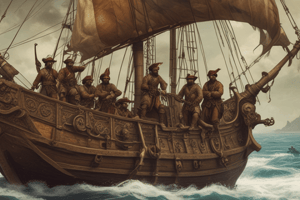Podcast
Questions and Answers
What were the primary forms of self-government in ancient Greek city-states?
What were the primary forms of self-government in ancient Greek city-states?
- Feudalism, Socialism, Capitalism
- Republic, Empire, Dictatorship
- Monarchy, Oligarchy, Theocracy
- Tyranny, Oligarchy, Democracy (correct)
The Athenian-led alliance of city-states fought against the Persians in the late fifth century BCE.
The Athenian-led alliance of city-states fought against the Persians in the late fifth century BCE.
False (B)
What was the major conflict between Athens and Sparta?
What was the major conflict between Athens and Sparta?
Peloponnesian War
The Greek word for city-state is ______.
The Greek word for city-state is ______.
Match the following terms with their definitions.
Match the following terms with their definitions.
Which of these were NOT used as slaves in early city-states?
Which of these were NOT used as slaves in early city-states?
Greek art initially focused on idealized depictions of humans, especially the nude.
Greek art initially focused on idealized depictions of humans, especially the nude.
What is the name given by the Greeks to foreigners unable to speak their language?
What is the name given by the Greeks to foreigners unable to speak their language?
The philosopher ____ advocated for honor and integrity over wealth and power in an ideal state.
The philosopher ____ advocated for honor and integrity over wealth and power in an ideal state.
Match the Greek philosopher with their key contribution:
Match the Greek philosopher with their key contribution:
Flashcards
City-States
City-States
Independent, self-governing entities in ancient Greece.
Polis
Polis
Greek term for city-state, emphasizing civic identity.
Forms of Self-Government
Forms of Self-Government
Types include tyranny, oligarchy, and democracy.
Peloponnesian War
Peloponnesian War
Signup and view all the flashcards
Phalanx
Phalanx
Signup and view all the flashcards
Chattel Slavery
Chattel Slavery
Signup and view all the flashcards
Economic Innovations
Economic Innovations
Signup and view all the flashcards
Colonial Communities
Colonial Communities
Signup and view all the flashcards
Role of Slaves in City-States
Role of Slaves in City-States
Signup and view all the flashcards
Common Name for Foreigners
Common Name for Foreigners
Signup and view all the flashcards
Naturalistic Art
Naturalistic Art
Signup and view all the flashcards
Socratic Philosophy
Socratic Philosophy
Signup and view all the flashcards
Plato's Ideal State
Plato's Ideal State
Signup and view all the flashcards
Study Notes
The Mediterranean World
- Political, economic, and social changes led to new societal structures in the second generation of societies.
- Violent upheavals freed many people from the control of Assyria and Persia.
- New ideas and societies emerged on the margins.
- Trade and ideas about city-states were exchanged.
Formation of New City-States
- Independent and self-governing city-states were established in the ninth and eighth centuries BCE.
- City-states were governed by their citizens.
- Notable city-states included Corinth, Thebes, Sparta, and Athens.
- Athens led an alliance against the Persians in the early fifth century BCE.
Self-Government and Democracy
- City-states were known as polis in Greek.
- Self-governance took various forms:
- Tyranny: rule by an individual chosen by the people.
- Oligarchy: rule by a few people.
- Democracy: rule by all free adult males.
- City-states included adult male citizens, free people, foreign immigrants, and enslaved individuals.
Families as Foundational Units
- Small families were important social units within city-states.
- Only adult free males held full citizenship rights.
- Women of free birth had limited standing, expected to remain in the private sphere of the family.
- Lower-class women often worked outside the home as laborers or vendors.
Competition and Armed War
- City-states were often in competition with each other over land, resources, trade, and religion.
- Frequent wars arose from these competitions.
- Military equipment and battle tactics, including the phalanx, developed and changed.
- The Peloponnesian War (431-404 BCE) was a significant conflict between Athens and Sparta.
- Despite wars, innovation and trade flourished throughout the Mediterranean.
Economic Innovations and Population Movement
- Free markets and money-based economies developed open trading markets with systems of money to ease exchanges.
- Barter and gift exchange systems were replaced by coin usage.
- Finding commodities and resources led to widespread trade.
- City-states established independent colonial communities along the western Mediterranean and Black Sea.
Chattel Slavery & Outside Encounters
- Human beings were bought and sold in a system of chattel slavery.
- Enslaved people were used for labor, including dangerous and demanding tasks.
- War captives often became slaves, playing a vital role in new city-states.
- Peoples from northern and central Europe were integrated into the city-state system.
- Greeks called foreigners "barbarians" who did not speak their language.
- Frontier peoples were often enslaved as Mediterranean empires grew more powerful.
New Ideas
- With the removal of monarchical and other forms of authority, ideas and beliefs circulated more freely.
- Art reflected naturalistic views of humans and their relationship with the universe.
- Early art depicted realities as artists saw them.
- Later art frequently depicted people in an idealized way, particularly the nude, which is a prominent feature of Greek art.
- Artists started to sign their artwork.
- Artists and thinkers included vase painter Exekias; sculptor Praxiteles; and poet Sappho, among others.
New Thinking and Greek Philosophers
- Philosophers sought to explain the cosmos with increasingly radical ideas.
- Prominent philosophers included Thales, Xenophanes, Democritus, and Pythagoras.
- Fifth-century BCE debates focused on humanity's place in society.
- Notable thinkers explored how to create an ideal state.
- Socrates (469-399 BCE) emphasized honor, integrity, and rejected wealth as the only source of power.
- Plato (427-347 BCE) outlined an ideal state in his work, The Republic.
- Aristotle (384-322 BCE) promoted studying facts to understand and comprehend.
Studying That Suits You
Use AI to generate personalized quizzes and flashcards to suit your learning preferences.




